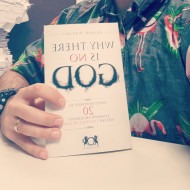
How to Kill a God
As an agnostic atheist I am willing to concede that I cannot disprove the existence of god as a general deistic idea. However, this doesn't mean that I can't disprove the existence of specific theistic gods. The fact is that these religions themselves have given me the tools to do just that within their own doctrines. I know this sounds like a pretty big claim, but just hear me out.
You see, these doctrines, along with offering philosophical ideas and edicts, are also supposedly records of what these gods have supposedly done within our known physical world. When these doctrines describe the supposed actions of these gods, it opens the door for us to actually fact check these supposed actions. When we proceed to fact check these claims we have a very awesome tool, known as forensic science, at our disposal. Forensic science is used in the disciplines of geology, archaeology, and even biology to reconstruct past events. Forensics is also used in legal proceedings to reconstruct past events to seek to prove a person's innocence or guilt, and is considered so reliable in that arena that it can be the entire basis of conviction, even in capital offenses which call for the death penalty. In the legal and scientific communities forensics is the bees knees, and when used correctly, it can be the great god killer.
Green eggs and Ham
Ken Ham, and many others, loves to ask people all the time how they can know something if they weren't there. He and others like to point to the bible or other doctrine and make the claim that their god was there and gave an account of what happened. This claim is then used to espouse the notion that these doctrines trump logic, common sense, and even observable facts.
The notion is absolutely ludicrous, and I'll happily explain why.
You see, there used to be a time when the only way we could know that something happened was by eyewitness testimony. If there were no eyewitnesses one could only speculate that something occurred and what that something was. This was especially troublesome in the judicial arena where the brunt of convictions came from first hand testimony. In those days all one had to do to get away with a crime was to make sure there weren't any witnesses.
As this problem grew, the judicial systems of many advanced and industrial societies looked to science for a way around this problem. As it so happens, science had an answer in the form of forensics. You see, scientists had long been trying to figure out our past by piecing together clues left behind. Geologists and archaeologists had begun to try and rebuild the history of this planet using only the few clues left behind. The idea being that we do not need an eyewitness account to make a definitive assertion about the past, but rather that we can make an assertion about the past based on the evidence we have today. This method has proven so valuable in the judicial arena that a conviction can be made with near 100% surety without even a body to show a crime was committed at all.
Practical Application
It is at this point that I would ask any biblical literalist a very simple question. If your child or spouse were murdered and there were no eyewitnesses, would you simply chalk it up as a loss or would you turn to science in the form of forensics to tell you who committed the crime? Obviously you can't turn to the bible, even though men such as Ham claim that all the answers are in there. You can't ask god to tell you who did it because even if there were a god to answer, your word that god spoke to you isn't worth a hill of beans in the courtroom. So who do you trust? Who do you turn to?
You turn to science of course. You turn to the people who can tell you what happened even though they weren't there. You turn to the people who ask for your trust, not your blind faith, in the notion that they can build a true and factual case based solely on the evidence at hand. And that is the real difference between science and religion. Religion asks for your faith in that which has no evidence of validity and science asks you to simply trust the evidence.
You Didn't Kill a God Yet...
So it should be apparent that this is a good case against biblical literalism or creationism, but how can we use forensic science to kill the idea of god?
Well, here's the thing; it all boils down to doctrines and specificity. You see each religion has its own doctrine and one of the main purposes of these doctrines is to describe their gods. Now, I'm not talking about appearance, because in most cases these gods are said to be incorporeal spirits that lack tangible substance. But we all know that there is a lot more to a description than just appearance. In fact, one of the best descriptions of someone or something is to describe what they do. Take guns for instance. They come in many shapes and sizes and their appearance greatly varies from one to the next. Yet we can describe what a gun does and easily understand what a gun is. Whether it's a pen gun or a shotgun, they all fire a projectile down a tube with the intent of causing damage to anything that projectile hits.
Just like guns, gods come in all sorts of appearances and most often without a given appearance at all. But nearly every god ever invented by mankind is said to have done things. This is a fundamental part of what the doctrines are all about. These doctrines often chronicle the supposed deeds of these supposed gods, and that is where forensics comes in. You see, using archaeology and geology we can actually look back through time and see if those things actually happened. When we do use forensic science to see if these things actually happened, we come to see that they in fact did not happen and moreover, many of those things are simply physically impossible.
So it comes down to a very simple idea. If the only measure of whether or not a god exists or not from a physical standpoint is to question whether the things doctrines claim gods have done are true or not, then if we find those things to be false we can dismiss those gods as fiction. When you measure a claim against reality and that claim lacks any physical merits then that claim can be dismissed as false. This applies to every god ever claimed to exist by any religion based on doctrine.
A final thought
I need to stress here one final idea. You see, while this method applies to all gods offered by religion through doctrine, it won't work against the deistic idea of god. The reason for this is that the only claim made for the deistic idea of god is generally that such a being exists and either created or set the universe in motion. At this point in our scientific understanding, there is no hard and definitive proof that such a claim is untrue. As science grows and provides better understanding, this claim may also be refuted definitively, but currently that simply isn't possible to do using the method I've offered here.

































